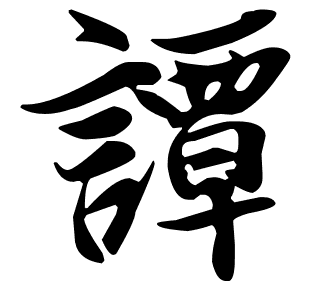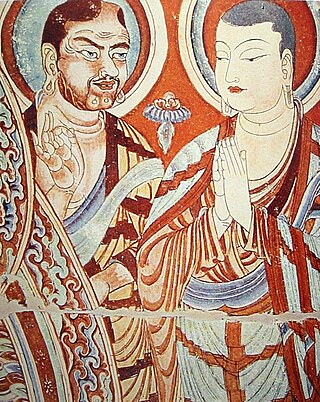Songyun is the atonal pinyin romanization of various Chinese names.
It may refer to:
- Songyun (monk), 6th-century Chinese Buddhist monk, pilgrim, and travel writer
- Songyun (Qing governor), 19th-century Manchu governor
Songyun is the atonal pinyin romanization of various Chinese names.
It may refer to:

Bodhidharma was a semi-legendary Buddhist monk who lived during the 5th or 6th century CE. He is traditionally credited as the transmitter of Chan Buddhism to China, and is regarded as its first Chinese patriarch. According to a 17th-century apocryphal story found in a manual called Yijin Jing, he began the physical training of the monks of Shaolin Monastery that led to the creation of Shaolin kungfu. He is known as Dámó in China and as Daruma in Japan. His name means "dharma of awakening (bodhi)" in Sanskrit.

Year 805 (DCCCV) was a common year starting on Wednesday of the Julian calendar, the 805th year of the Common Era (CE) and Anno Domini (AD) designations, the 805th year of the 1st millennium, the 5th year of the 9th century, and the 6th year of the 800s decade.

Year 826 (DCCCXXVI) was a common year starting on Monday of the Julian calendar, the 826th year of the Common Era (CE) and Anno Domini (AD) designations, the 826th year of the 1st millennium, the 26th year of the 9th century, and the 7th year of the 820s decade.

Shaolin kung fu, also called Shaolin Wushu, or Shaolin quan, is one of the oldest, largest, and most famous styles of wushu, or kung fu of Chan Buddhism. It combines Chan philosophy and martial arts. It was developed in the Shaolin Temple in Henan province, Greater China during its 1500-year history. Popular sayings in Chinese folklore related to this practice include "All martial arts under heaven originated from Shaolin" and "Shaolin kung fu is the best under heaven," indicating the influence of Shaolin kung fu among martial arts. The name Shaolin is also used as a brand for the so-called external styles of kung fu. Many styles in southern and northern China use the name Shaolin.

Faxian, formerly romanized as Fa-hien and Fa-hsien, was a Chinese Buddhist monk and translator who traveled on foot from Jin China to medieval India to acquire Buddhist scriptures. His birth name was Gong Sehi. Starting his journey about age 60, he traveled west along the overland Silk Road, visiting Buddhist sites in Central, South, and Southeast Asia. The journey and return took from 399 to 412, with 10 years spent in India.

A bhikkhu is an ordained male in Buddhist monasticism. Male and female monastics are members of the Sangha.
Rufinus may refer to:

Tan is a common Chinese surname 譚, and is considered the 56th most common.

Kāṣāya are the robes of fully ordained Buddhist monks and nuns, named after a brown or saffron dye. In Sanskrit and Pali, these robes are also given the more general term cīvara, which references the robes without regard to color.
Among Buddhists, death is regarded as one of the occasions of major religious significance, both for the deceased and for the survivors. For the deceased, it marks the moment when the transition begins to a new mode of existence within the round of rebirths. When death occurs, all the karmic forces that the dead person accumulated during the course of their lifetime become activated and determine the next rebirth. For the living, death is a powerful reminder of the Buddha's teaching on impermanence; it also provides an opportunity to assist the deceased person as they transition to a new existence. There are several academic reviews of this subject. In Buddhism, death marks the transition from this life to the next for the deceased.
Song Yun or Songyun was a Chinese Buddhist monk who travelled to medieval India from the Tuoba Northern Wei kingdom during China's Northern and Southern dynastic period at the behest of the Empress Hu. He and his companions Hui Zheng, Fa Li, and Zheng or Wang Fouze left the Wei capital Luoyang on foot in 518 and returned in the winter of 522 with 170 Buddhist scriptures. Song and Hui's accounts of their journey are now lost but much of their information was preserved in other texts.
Songyun (1752–1835) was a military governor (amban) of the Qing provinces of Xinjiang, Guangdong, and Tibet from 1802 to 1809.
Wang Tingkai was a Chinese official exiled to the Central Asian frontier during the period in office of the Military Governor Songyun (1802–9). He was one of the most prominent of the exiled officials used by Songyun to compile his gazetteer of Xinjiang, together with Qi Yunshi and Xu Song.
Qi Yunshi (1751–1815) was a Chinese official and historian exiled to Central Asia between 1805 and 1809 who together with Wang Tingkai and Xu Song was prominent among the exiled officials employed by Songyun, the military governor of Xinjiang from 1802 to 1809, to compile a gazetteer of Xinjiang. He also wrote a history of the Chinese border regions.

Xu Song 徐松 (1781–1848) was a Chinese official exiled to Central Asia during the period of the military governorship of Xinjiang of Songyun. He was prominent with Wang Tingkai and Qi Yunshi among the officials employed by Songyun to compile his gazetteer of Xinjiang.
Rǎn is the Mandarin pinyin romanization of the Chinese surname written 冉 in Chinese character. It is romanized Jan in Wade–Giles. Ran is listed 301st in the Song dynasty classic text Hundred Family Surnames. As of 2008, it is the 178th most common surname in China, shared by 670,000 people.

With You is a 2016 Chinese streaming television series based on the novel The Best of Us (最好的我们) by Ba Yue Chang An (八月长安). It stars Liu Haoran and Tan Songyun in lead. It aired on iQiyi from 8 April to 14 May 2016.

Go Ahead is a 2020 Chinese television drama series, which revolves around three non blood-related kids who became each other's family. It premiered on Hunan TV on August 10, 2020. The series was a hit, and was well received by audiences for its warm familial theme. It aired on iQIYI globally with multi-language subtitles on October 8, 2020. In Vietnam, it aired on FPT Play on August 12, 2020 and on YouTube by Huace TV Vietnam on November 11, 2020. Netflix also gained the rights to air the show.
Hui Zheng or Huizheng, also known as Hoei Sing and by other romanizations, was a Chinese Buddhist monk who travelled to medieval India with Songyun and others.